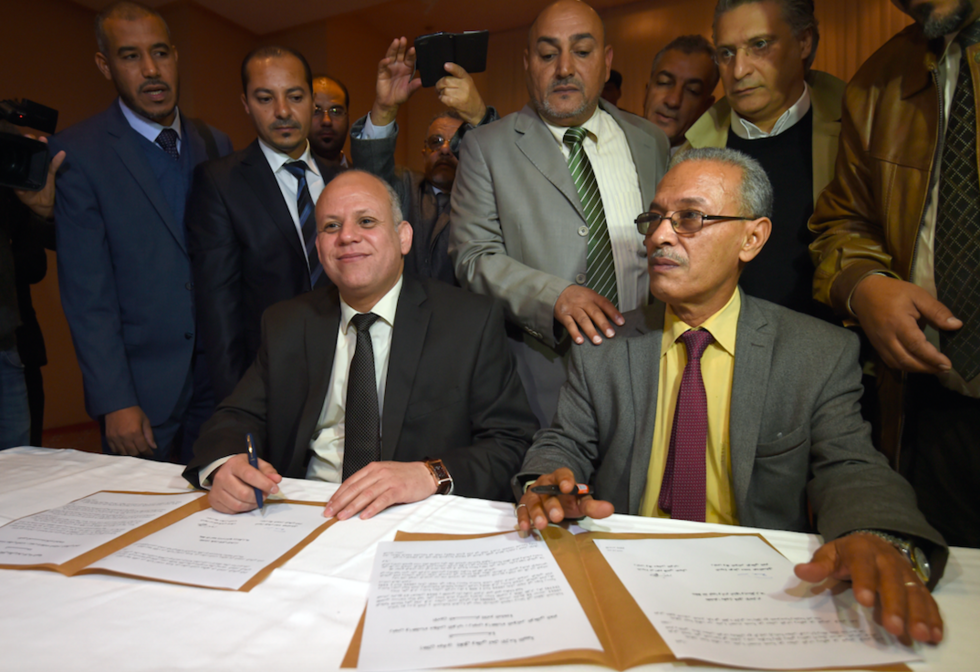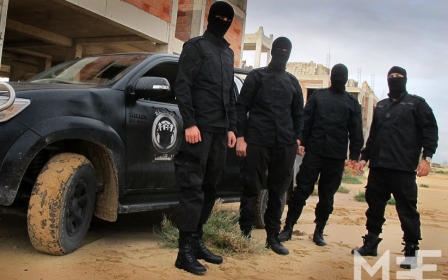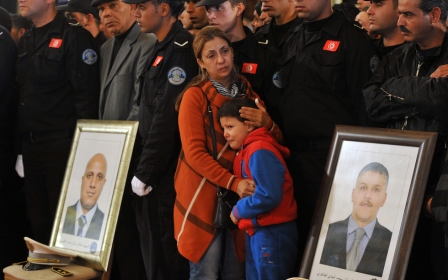Warring Libyan factions reach preliminary peace deal: Officials

Warring Libyan factions meeting in Tunisia said on Sunday they had reached an agreement, which has to be approved by the country's rival parliaments, on ending the political deadlock that has plagued the country since Muammar Gaddafi's overthrow in 2011.
"This is a historic moment the Libyans were waiting for, the Arabs were waiting for and the world was waiting for," said Mohammed Awad Abdul-Sadiq, the first deputy head of the Tripoli-based General National Congress (GNC), after the talks with the rival House of Representatives.
GNC officials had been holding talks in the suburbs of the Tunisian capital, Tunis, for several days with delegates from the Tobruk-based House of Representatives (HoR).
Abdul-Sadiq called on Libyans to support what he called "a historic opportunity".
"If this solution receives real Libyan support - from the people and institutions - we will surely arrive in no more than two weeks or a month to a solution to solve the political crisis," he told a press conference.
MEE obtained an Arabic copy of the agreement, the text of which emphasises that the Libyan representatives met without any foreign interference or preconditions.
It reads: "[The agreement] aims at launching the basis of a transparent cooperation between the two sides in order to reach a political agreement ensuring the formation of a national unity government."
A key point in the document is the agreement that in the upcoming two weeks, a committee of 10 members from parliament (five MPs each from the HoR and the GNC) is tasked of working during 10 days to designate a prime minister and two deputy prime ministers.
According to that statement, the representatives agreed to restore the constitutional legitimacy of the former Libyan constitution as the best option to resolve the problems of the legislative authority in the country, and to help create the climate to hold legislative elections within two years.
Amna Emtair from the GNC delegation told AFP the agreement would set up a new representative body that would choose a committee to nominate a prime minister within 15 days, while another committee would conduct a review of Libya's constitution.
"It is a major breakthrough," Emtair said.
Libya descended into chaos after the October 2011 overthrow and killing of longtime ruler Gaddafi, with two new governments vying for power and armed groups battling for control of its vast energy resources.
NATO on Sunday said it was ready to help a future national unity government in Libya, although it did stress that it remains opposed to any military intervention in the war-torn country, alliance secretary-general Jens Stoltenberg said.
"If a national unity government is formed, we are ready to help it and provide assistance," Stoltenberg said in an interview with Italy's Repubblica and several other European newspapers ahead of an international conference on Libya in Rome on 13 December.
However, "we are not discussing a major new military operation in Libya, and I will not be recommending it," he said.
His remarks were published just hours before the preliminary deal was announced.
NATO has been deeply concerned that the political vacuum has allowed the Islamic State (IS) group to gain a foothold in parts of the Mediterranean country.
Former colonial power Italy is expecting to host the 13 December conference aimed at preventing Libya's total collapse and halting the advance of IS.
Experts have warned that IS has been shifting to Libya as the world focuses on its power bases in Iraq and Syria.
Italian Prime Minister Matteo Renzi pointed to the crisis in Libya as he sought to defend Rome's decision not to join international military action against IS.
The north African country was thrown into chaos after a 2011 revolt backed by Western military intervention overthrew Gaddafi.
"If being a protagonist means adding to the bombardments of others, then I say no thanks. Italy already used this strategy in Libya in 2011," Renzi told the Corriere della Sera newspaper.
"Four years of civil war in Libya shows this was not a wise choice. Today there needs to be another strategy."
Additional reporting done by Massinissa Benlakehal
New MEE newsletter: Jerusalem Dispatch
Sign up to get the latest insights and analysis on Israel-Palestine, alongside Turkey Unpacked and other MEE newsletters
Middle East Eye delivers independent and unrivalled coverage and analysis of the Middle East, North Africa and beyond. To learn more about republishing this content and the associated fees, please fill out this form. More about MEE can be found here.




